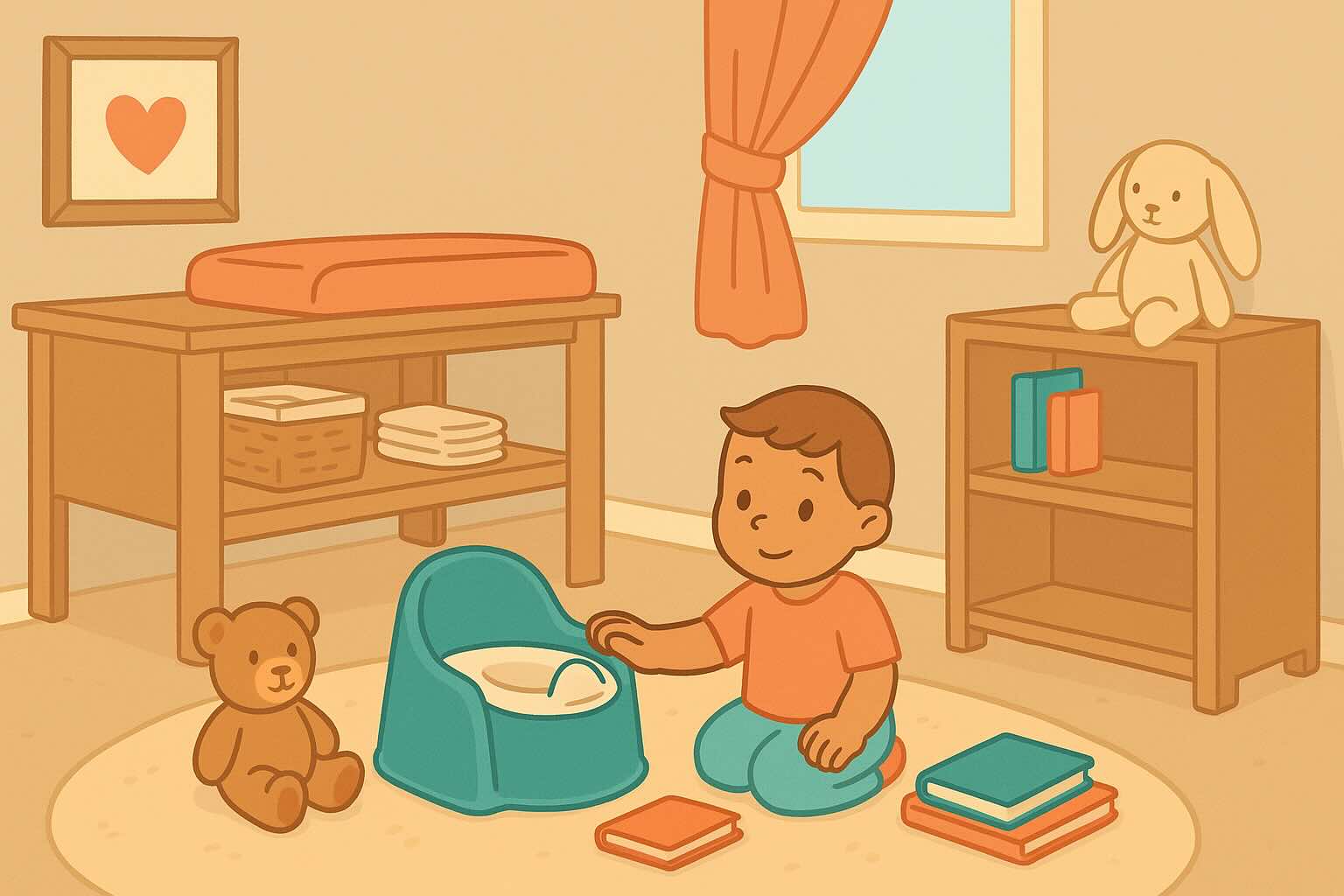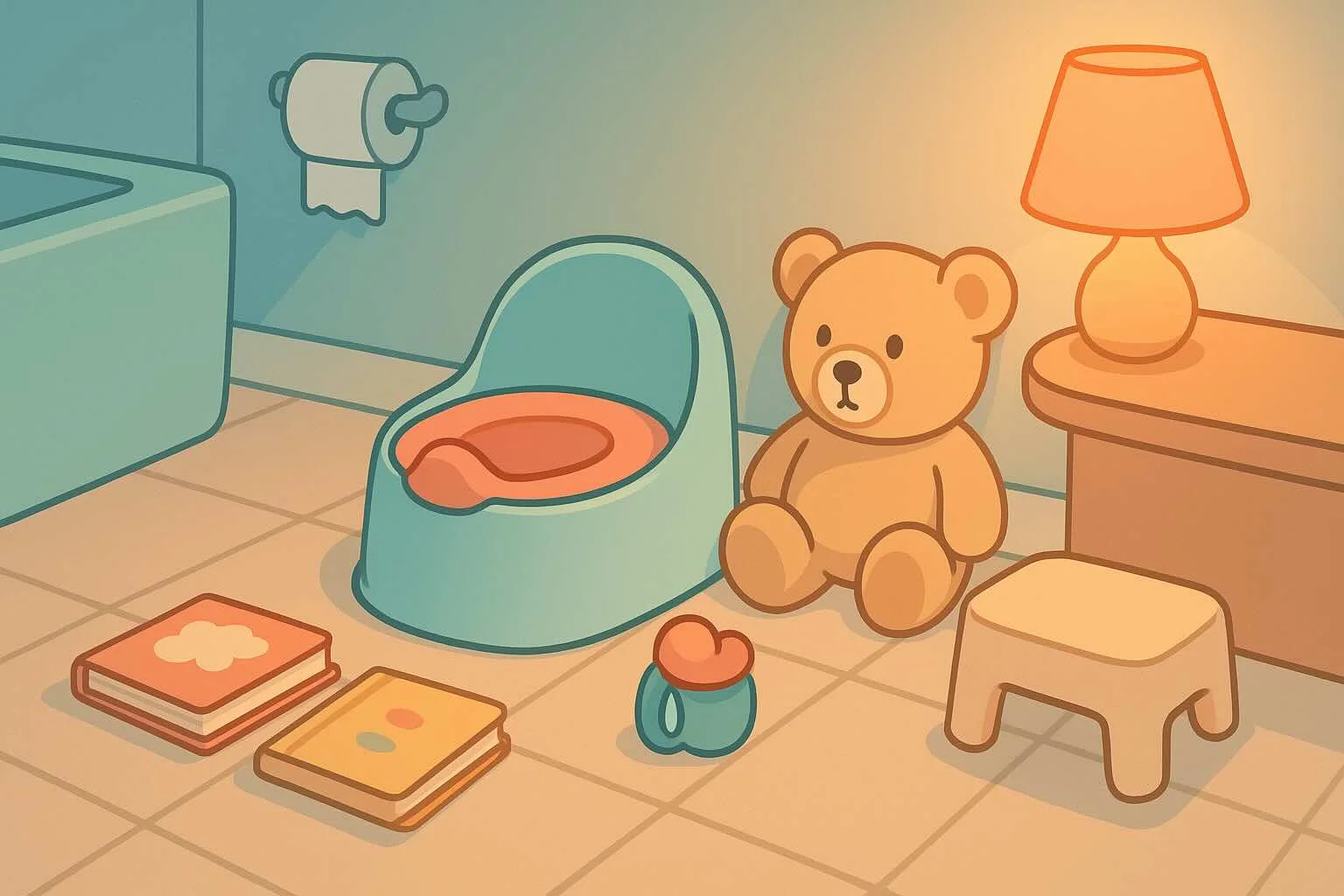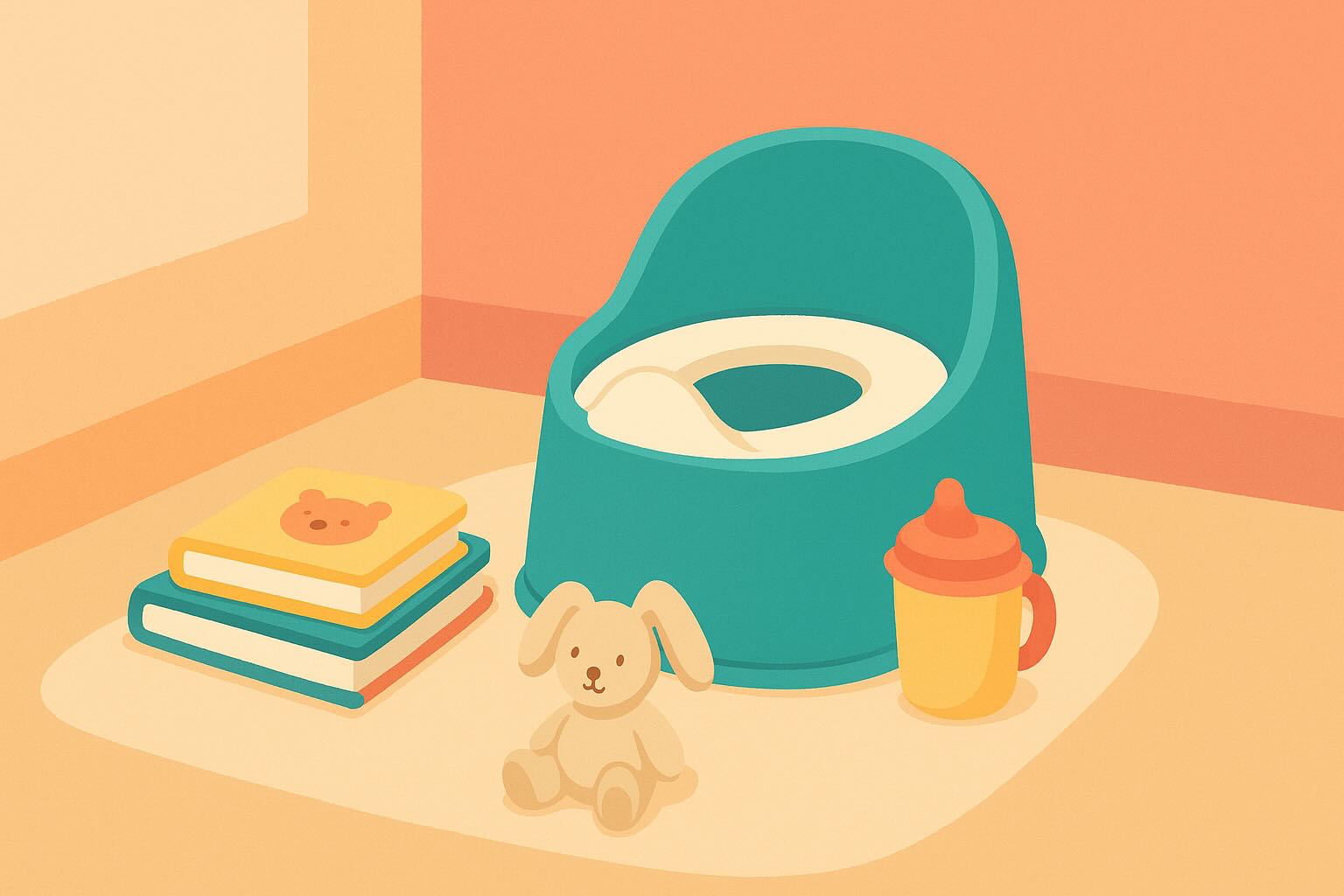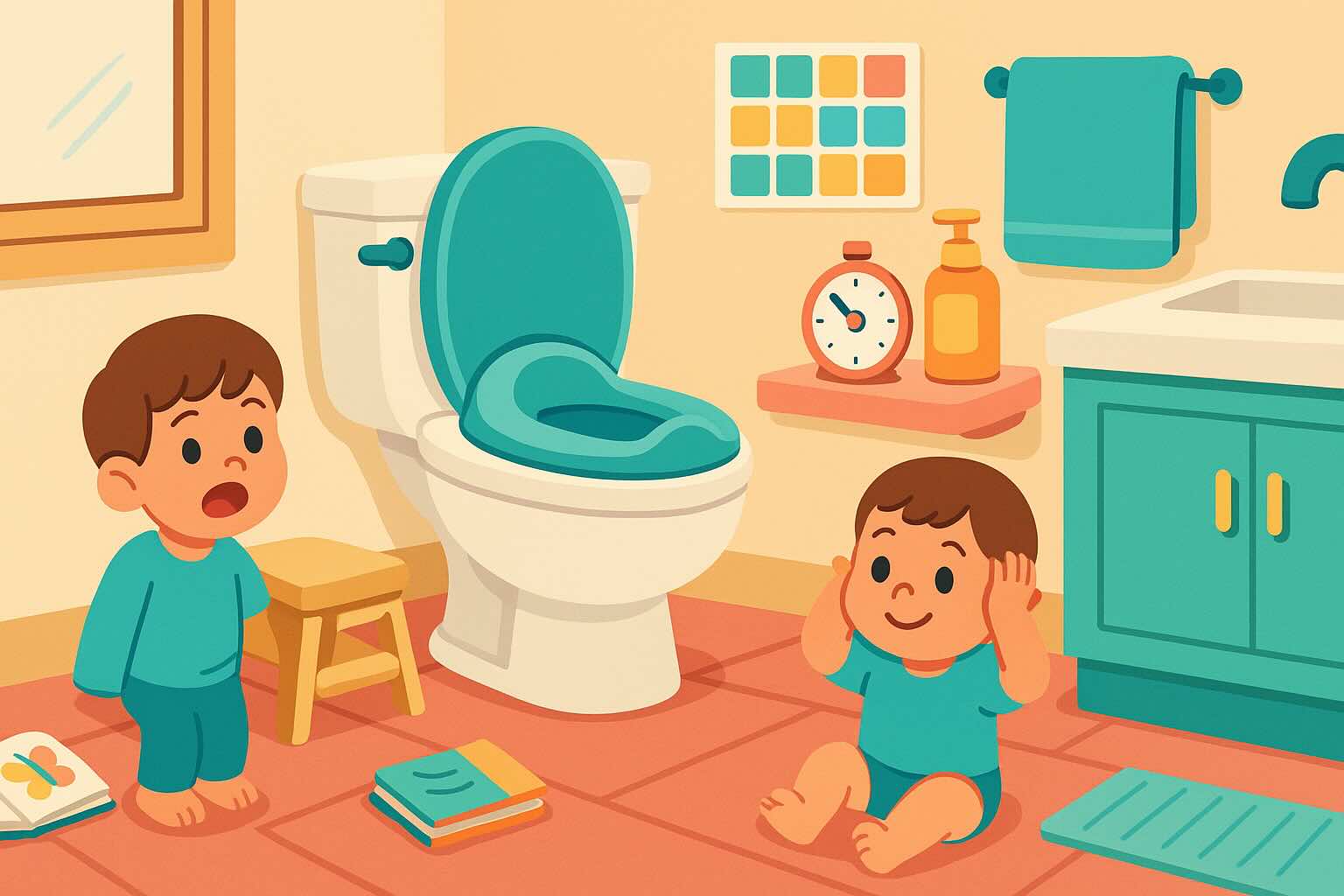Potty Training with New Baby: Navigating Two Big Transitions


You're pregnant with your second child, and the potty training question looms: Should I start now, or wait until after the baby arrives? Or perhaps you're already home with your newborn, and your previously potty-trained toddler is suddenly having daily accidents.
The intersection of potty learning and new sibling arrival is one of the most challenging transitions parents face. You're managing two major developmental milestones—your toddler's growing independence and your family's expansion—while sleep-deprived and stretched thin.
Here's what I've learned supporting hundreds of families through this transition: there's no perfect timing, but there are strategic approaches that make the journey significantly easier for everyone.
This guide will help you navigate timing decisions, prevent (or respond to) regression, and maintain connection with your toddler during this major family change.
Understanding the New Baby-Potty Training Connection
Before we dive into strategies, let's understand why new sibling arrival and potty learning are so intertwined.
Why New Babies Trigger Potty Regression
When families tell me "my toddler was doing great, but now they're having accidents constantly since the baby arrived," they're describing one of the most common stress responses in early childhood.
Regression is communication. Your toddler isn't being manipulative or deliberately difficult—they're showing you, through their behavior, that they're overwhelmed by the massive change in their world.
Think about it from your toddler's perspective: the person who has been their entire world is suddenly holding, feeding, and cooing at someone else for hours each day. The skills that recently made you proud (using the potty independently) now get less attention than the baby's every diaper change.
Research on sibling adjustment shows that most children experience some regression in recently learned skills (sleep, potty, behavior) when a new baby arrives. This is developmentally normal, not a failure of your teaching or their learning.
The Attention Paradox
Here's the tricky dynamic: diaper changes for baby often involve more parent attention and interaction than successful potty use by your toddler.
Your toddler's developing brain makes a logical connection: Needing help with bathroom stuff = getting parent's attention.
This can create a challenging pattern where accidents increase because they reliably bring you away from the baby and focused on your toddler—even if the attention is just cleanup.
We'll address how to shift this dynamic in the strategies section.
The "Big Kid" Narrative Backfire
One common mistake parents make is framing potty learning as part of "becoming a big kid" in preparation for the baby. This approach, while well-intentioned, often backfires.
Research from developmental psychology shows that when children associate independence skills with being "the big kid," the arrival of the baby can trigger a desire to return to "little kid" status to reclaim parental attention and care.
Note: Dr. Becky Kennedy's Good Inside approach emphasizes the importance of avoiding the "big kid" pressure narrative, instead focusing on body awareness and capability without comparison to baby status. This prevents the regression dynamic where children associate potty accidents with getting the nurturing attention they observe babies receiving.
Instead of "You're going to be a big brother/sister, so you need to use the potty," try "Your body is learning to recognize the pee/poop feeling, and you're getting really good at knowing when it's time for the bathroom."
The Timing Decision Framework
Let's tackle the biggest question: when to approach potty learning in relation to your baby's arrival.
Option 1: Complete Before Baby Arrives (3-4 Months Ahead)
This works well if:
- Your toddler is showing strong readiness signs now
- You have at least 3-4 months before your due date
- You have the bandwidth to support learning now
- Your toddler tends to adapt well to change
The advantage: Your toddler has time to solidify skills before the family transition, and you can give focused attention to the learning process.
The timeline: Aim to complete the intensive learning phase at least 6-8 weeks before your due date. This gives your toddler time to practice skills before their world shifts, and gives you time to rest in late pregnancy.
Realistic expectations: Even if your toddler is fully trained before baby arrives, some regression when baby comes home is normal. Don't consider it a failure—it's adjustment.
Option 2: Wait Until After Baby Arrives (3-6 Months Later)
This works well if:
- Your toddler isn't showing clear readiness signs yet
- You're less than 3 months from your due date
- You're exhausted from pregnancy or complications
- Your toddler tends to need extra time to adjust to change
The advantage: Your toddler can fully adjust to the new sibling before tackling a new skill, and you can focus your limited energy on one major transition at a time.
The timeline: Most experts recommend waiting until baby is at least 3 months old and sleeping slightly longer stretches. This gives your toddler time to adjust to the sibling, and gives you a chance to recover from the newborn intensity.
Realistic expectations: Starting fresh after baby's arrival can actually be easier than managing regression, since you're building the skill when your toddler is developmentally ready rather than trying to maintain it during stress.
Option 3: Maintain, Don't Advance (During Transition)
This works well if:
- Your toddler is partially trained when baby arrives
- You want to keep some skills without pushing for perfection
- You need flexibility during the adjustment period
The approach: Keep the potty routine you have (offering opportunities, celebrating successes) without pushing for progress. Think of this as "holding ground" rather than advancing or retreating.
Use pull-ups strategically: During the hardest parts of the day (morning chaos, evening dinner/bedtime with two kids), pull-ups can reduce your stress without fully reverting to diapers.
Realistic expectations: Progress may be slow or nonexistent during this phase, and that's okay. Your goal is maintaining connection and reducing power struggles, not achieving independence.
The "Avoid If Possible" Window
Try not to start potty training:
- In the month before your due date (you need your energy for birth)
- During the first 6-8 weeks after baby arrives (everyone is adjusting)
- If your toddler is already showing major stress responses (sleep regression, increased tantrums, separation anxiety)
If you're already in this window and halfway through potty training, see Option 3 above. Don't add the stress of "going backward"—just pause progress.
Regression Prevention Strategies
If your toddler is already potty trained (or learning) when baby arrives, these strategies can minimize regression.
1. Make Baby Diaper Changes Boring
This is counterintuitive but powerful: the less interaction baby gets during diaper changes, the less your toddler will want to recreate that need.
What this looks like:
- Quick, efficient diaper changes with minimal talking or eye contact with baby
- Save the cooing, games, and connection for times when baby is clean and content
- If toddler is present, don't make baby changes into entertainment ("Look how baby kicks!")
The message to your toddler: Needing diaper help is just functional care, not a special connection time.
2. Make Toddler Potty Time Special
Create the opposite dynamic: using the potty successfully earns your toddler special connection time.
What this looks like:
- "You used the potty! Do you want to pick a book for us to read together?"
- Sitting on the bathroom floor during toddler's potty time, fully present (put your phone down)
- Special songs or games that only happen during potty routine
- One-on-one time as the "reward" for successful potty use
The message to your toddler: Using the potty = connection with you, not just avoiding mess.
3. Proactive Connection Filling
Many accidents happen because your toddler's "connection tank" is empty and they're seeking your attention through the most reliable method: needing help.
Schedule connection before the need arises:
- 10-15 minutes of one-on-one time with toddler each day (during baby's nap if possible)
- Special toddler activities while baby is awake but content (baby wearing allows this)
- Maintain at least one pre-baby routine that's just yours and toddler's (bedtime stories, morning snuggle, specific meal together)
Research shows that children who receive proactive one-on-one attention each day show fewer attention-seeking behaviors, including regression.
4. Language That Doesn't Compare
Avoid language that positions potty training as "being big" in contrast to baby "being little." This can trigger regression as your toddler tries to reclaim "little" status.
Instead of this:
- "You're the big kid now, you use the potty!"
- "You don't need diapers like the baby does"
- "Show the baby how big kids go potty"
Try this:
- "You're learning to use the potty, and you're doing great"
- "Remember when you wore diapers? Now you're learning something new"
- "Baby will learn to use the potty when they're ready, just like you did"
The principle: Each child is on their own developmental journey, not in competition.
5. The "Both/And" Acknowledgment
When your toddler shows regression or expresses wanting to be "a baby again," acknowledge the feeling without changing your approach.
What this sounds like:
- "Sometimes when there's a new baby, kids wish they could be little again too. That makes sense."
- "You're noticing that baby gets lots of care. You also need care, even though you're learning new things."
- "It's okay to have big feelings about the baby. You can talk to me about them anytime."
Follow the acknowledgment with connection, not with reverting to diapers (unless you've made a strategic decision to pause training altogether).
Managing Jealousy-Based Accidents
When accidents spike specifically during baby care times, you're likely seeing jealousy-based behavior. Here's how to respond without reinforcing the pattern.
The Pattern to Watch For
Jealousy accidents look like:
- Your toddler has an accident right when you sit down to feed baby
- Accidents increase when baby is crying and getting your attention
- Your toddler "forgets" to use the potty during baby care, but remembers at other times
- Accidents happen more with one parent (usually the one doing most baby care)
What's happening: Your toddler has learned that accidents reliably pull your attention away from baby and onto them. It's not manipulation—it's a stress response to feeling displaced.
The Response Strategy
In the moment:
- Acknowledge without rushing: "I see you had an accident. I'll help you clean up as soon as I finish with baby" (if baby is mid-care)
- If baby is safe/content, pause baby care briefly: "Let me help you change. Baby can wait a minute."
- Keep cleanup quick and calm (not punitive, but not extended connection time either)
- Circle back: "I'm here now. Do you want to tell me about your accident?"
The principle: You show that you'll meet their need, but you don't reinforce accidents as the best way to get your attention.
The Prevention Strategy
Offer connection proactively during baby care:
- "Baby is eating. This is a good time for us to read together. Want to sit next to me?"
- "While I change baby's diaper, can you tell me about what you built earlier?"
- During baby's awake floor time: "Baby is playing. Want to do a puzzle together while they're happy?"
The pattern shift: Your toddler learns they can get your attention without creating a bathroom crisis.
Involving Toddler in Baby Care (Without Creating Pressure)
Gentle involvement in baby care can help your toddler feel included rather than displaced, but it's a delicate balance.
Healthy Involvement Looks Like
Option-based participation:
- "Would you like to choose baby's outfit, or do you want to play while I get baby dressed?"
- "Can you sing baby a song while I change their diaper?"
- "Should we give baby the rattle or the soft toy?"
The key: Your toddler can choose to participate or not, without pressure or praise that creates expectations ("You're such a good helper!").
What to Avoid
Don't make your toddler responsible:
- Asking them to "help" with every baby task
- Praising them for being a "big helper" (creates pressure to always help)
- Comparing their abilities to baby's needs ("You can get your own drink, but baby needs me")
Don't violate your toddler's bathroom privacy:
- Having baby present during toddler's potty time when toddler prefers privacy
- Asking toddler to demonstrate potty use "for the baby"
- Making toddler's bathroom routine a teaching moment for baby
The principle: Inclusion should feel like belonging to the family, not like a job or performance.
When You're Too Exhausted to Manage Both
Let's be honest: the early weeks with a newborn are survival mode. If you're trying to support potty learning while sleep-deprived and touched-out, something has to give.
It's Okay to Lower the Bar
Permission to:
- Use pull-ups during the hardest parts of the day (morning rush, bedtime chaos, outings)
- Stop actively teaching and just maintain what you have
- Accept that your toddler uses the potty once or twice a day and that's enough right now
- Take a full break from potty training if you're overwhelmed (you can restart in a few months)
This isn't failure. It's recognizing that your capacity matters, and your emotional availability to both children is more important than potty independence right now.
Getting Specific Help
If you have support people (partner, family, friends), ask for specific help with potty training:
Instead of: "Can you help with the kids?"
Try:
- "Can you handle toddler's potty routine when you get home from work?"
- "Can you take toddler to the bathroom every hour during your visit?"
- "Can you be the one to clean up accidents while I'm nursing?"
People want to help but often don't know how. Specific requests make it easier for them to actually support you.
Re-establishing Routine After Baby's Arrival
If your toddler has regressed since baby arrived, here's how to gently rebuild the routine without power struggles.
Start With Connection, Not Correction
Before re-establishing potty expectations, spend a week focused purely on rebuilding connection with your toddler:
- Daily one-on-one time (even 10 minutes)
- Returning to a pre-baby routine they loved
- Physical affection on their terms
- Acknowledging the adjustment ("So much has changed. I see that you're figuring out what it all means.")
Why this matters: Children can't learn new skills (or remember old ones) when they're in a state of stress and disconnection.
The Gentle Restart
After a week or two of connection focus, reintroduce potty routine gradually:
Week 1: Just offer opportunities without expectations
- "It's been a while since you sat on the potty. Want to try?"
- Celebrate attempts, ignore refusals
Week 2: Add gentle structure
- Offer potty opportunities at key times (waking, before meals, before bed)
- Use pull-ups if helpful, but frame them as a bridge: "You can wear these while you're learning again"
Week 3: Increase expectations slowly
- "We're going to try using the potty before we go to the park"
- Respond to accidents calmly: "Looks like you had an accident. Let's clean up and try again next time"
The timeline: Most toddlers can re-establish solid skills within 4-8 weeks with this patient approach.
When to Seek Additional Support
Consider reaching out to your pediatrician if:
- Regression persists beyond 3 months after baby's arrival
- Your toddler shows signs of pain or fear around bathroom use (not just reluctance)
- Accidents are increasing rather than decreasing over time
- Your toddler is showing other major behavioral changes (aggression, withdrawal, sleep disturbances) alongside potty regression
- You're feeling overwhelmed or resentful about the situation
Sometimes regression signals that your toddler needs more support processing the family change—and that's okay to get help with.
Your Toddler Still Needs Connection
Throughout this transition, your toddler's core need hasn't changed: they need to know they're still important to you, still loved, still held in your mind even when you're holding the baby.
Potty training—or regression—is just one way they communicate that need.
The timeline doesn't matter as much as the connection. Whether you complete potty training before baby, after baby, or in fits and starts during the adjustment period, what matters most is that your toddler feels secure in their relationship with you.
Some days, that means celebrating potty successes. Other days, it means calmly cleaning up accidents while telling your toddler "We're figuring this out together."
Both are part of the journey.
Related Resources
- Potty Learning Complete Guide - Comprehensive overview of the entire potty learning journey
- Potty Training Regression Guide - Deep dive into regression triggers and recovery strategies
- Potty Training Accidents Guide - Managing accidents with calm confidence
- 2 Year Old Potty Training Guide - Readiness-focused approach for toddlers
- 3 Year Old Potty Training Guide - Strategies for preschool-age children
- Daycare Potty Requirements Guide - Navigating deadlines during family transitions
Complete Potty Learning Toolkit
Readiness assessments, age-specific strategies, and practical scripts to support your child's potty learning journey.
Need personalized support?
RootWise's AI coach can provide tailored strategies for your specific situation, available 24/7 when you need it most.
Learn More About AI Coaching →



